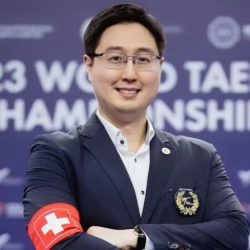
Courtesy of World Taekwondo
Pursue every opportunity, stay prepared, and never lose sight of your dreams.
Dae Hyoun (David) Jeong, MD, FAAFP
Medical Director of UCSF Primary Care at Laurel Village and Chair of the World Taekwondo (WT) Medical and Anti-Doping Committee
Meet Dae Hyoun (David) Jeong, MD, FAAFP, Medical Director of UCSF Primary Care at Laurel Village, Director of point-of-care ultrasound (POCUS) for UCSF/ZSFG FM Residency, and Chair of the World Taekwondo (WT) Medical and Anti-Doping Committee. He recently returned from the Paris 2024 Olympic Games. Here Dr. Jeong shares his role and experience at the Games and his career journey to Olympic Sports Medicine and Family Medicine.
My role at the Paris 2024 Olympic Games
As the International Federation (IF) Medical Officer for the Paris 2024 Olympic Taekwondo Games, representing WT (the governing body for Olympic Taekwondo) in medical, safety, and anti-doping matters, I was actively involved in emergency action planning and organizing medical services and resources for the Games, beginning a year in advance. I collaborated closely with the Olympic and Paralympic Games Organizing Committee, including Dr. Philippe Le Van, the Chief Medical Officer for the 2024 Olympics, to ensure the highest standards of safety and medical requirements were met for Taekwondo, a full-contact sport with a high risk of severe injuries.
During the Taekwondo events, I briefed head coaches and team doctors from 60 participating countries on medical rules and emergency action plans. I trained and supervised the venue medical team on Taekwondo-specific emergency evacuation and assessment protocols, conducted a workshop for international referees on medical-technical procedures, and collaborated with team medical staff from participating countries to manage injuries. I made critical decisions during competitions regarding the continuation of injured athletes (if the injured athlete can continue or not). Additionally, I was involved in the anti-doping process for athletes, in collaboration with the International Testing Agency (ITA).

I have been involved with WT, as the Chair of the WT Medical and Anti-Doping Committee since September 2017. I have participated in four Olympic Games: the 2018 PyeongChang Winter Olympic Games as Venue Medical Director of the Olympic Sliding Center, the 2018 Buenos Aires Junior Olympic Games as IF Medical Officer for Taekwondo, and the 2020 Tokyo Olympics and Paralympic Games as IF Medical Officer for Taekwondo.
Inspiring moment at the 2024 Olympics
During the Gold medal match for the male -58kg Taekwondo competition, Azerbaijani athlete Gashim Magomedov suffered a serious injury. Despite his struggle, he was determined to continue, and I allowed him brief treatments—giving him one more chance than we usually allow in such situations—because of the significance of the Olympics for these athletes. Although he ultimately had to withdraw, he appreciated the care and the chance to continue a few more times. The gold medal winner, Taejun Park, supporting the injured athlete during the medal ceremony was a very touching moment.
My motivation for pursuing Olympic Sports Medicine and Family Medicine
Originally from South Korea, I practiced Taekwondo for five years during my youth (achieving a 2nd-degree black belt). Although I had to stop when I entered middle school, my passion for the sport remained. This inspired me to pursue a career that allowed me to stay involved in Taekwondo as a primary care sports medicine doctor. When I entered medical school in Korea, I dreamed of becoming an Olympic sports medicine physician and pioneering Taekwondo Medicine. Since there wasn’t a formal sports medicine training program in Korea and family medicine wasn’t widely recognized, I decided to pursue my training and career in the U.S. due to my passion for primary care and sports medicine.
Joining UCSF
Working at UCSF has been a dream of mine throughout my professional career as an academic family medicine and sports medicine physician. UCSF’s outstanding reputation as a leading academic institution in research and primary care, with its strong emphasis on diversity, inclusion, health equity, and providing opportunities for all, strongly attracted me. I also fell in love with San Francisco when I first visited 20 years ago. My goal has always been to better serve a culturally-diverse community, drawing on my East Asian background, and to contribute to a teaching institution with my unique training in family medicine, sports medicine, geriatrics, and POCUS. I was eager to pursue professional growth in academic family medicine and sports medicine, along with developing clinical leadership skills under strong support and mentoring. Additionally, the opportunity to develop a POCUS program at the UCSF Family Medicine Residency Program and UCSF Health Primary Care was a significant draw for me, as promoting POCUS in primary care is something I am deeply passionate about. In fact, I used POCUS on a few athletes at the Olympics. I am so grateful to have joined UCSF and to have these incredible opportunities.

How my UCSF role and Olympics role relate
Leadership, communication, and a commitment to diversity, inclusion and equity are crucial in both Olympic sports medicine and my role as Medical Director at UCSF Primary Care at Laurel Village. Whether leading a multidisciplinary team at the Olympics or managing a primary care clinic, these experiences have mutually enhanced my ability to adapt and lead effectively in diverse settings. Both roles require strong interpersonal and communication skills, ensuring medical preparedness, providing optimal medical services with the available resources and personnel, and overseeing emergency action planning. Leading a team and collaborating with others involve making sound and fair decisions based on established rules and priorities (with patient safety always coming first) while fostering an inclusive environment where diverse perspectives are valued and respected. I believe that embracing diversity and inclusion has been key to my growth and effectiveness as a leader. Through these experiences, I have learned a great deal and grown professionally.
Tips for aspiring Olympic sports physicians
Pursue every opportunity for volunteering in sports coverage. Be prepared for those moments, and keep knocking on doors until they open for you. In 2016, I volunteered as the Medical Director for the Illinois State Taekwondo Championships, where I gained invaluable experience in managing Taekwondo injuries. In 2017, I actively sought out and requested a volunteer opportunity at the World Taekwondo Championships, even paying for my own international trip to Korea and bringing my own portable ultrasound machine, which was extremely helpful in evaluating and managing more than 100 injured athletes during a week of intense competitions. This opportunity led to my becoming the Chair of the World Taekwondo Medical and Anti-Doping Committee after they recognized my genuine passion and interest in Taekwondo medicine. Pursuing a 2-year diploma program in sports medicine through the International Olympic Committee (IOC) has also been instrumental in my journey. When I applied for a medical volunteer position at the 2018 Pyeongchang Winter Olympics during my geriatric fellowship in 2016, after completing my sports medicine fellowship in 2015, I already had my IOC diploma and experience covering several international sporting events, which was invaluable. Never lose sight of your dreams.




